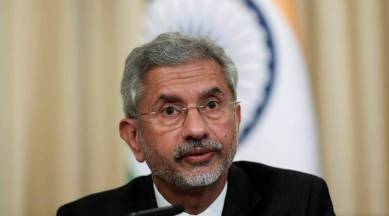Stay updated with the latest - Click here to follow us on Instagram
State of border will determine state of India-China relationship: Jaishankar
Jaishankar said that much of the future of Asia depends on how the relations between India and China develop in the foreseeable future.

External Affairs Minister S Jaishankar has said that the state of the border will determine the state of the India-China relationship. He also said that for ties to return to a positive trajectory and remain sustainable, they must be based on the three mutuals — mutual sensitivity, mutual respect, and mutual interest.
His comments came at the launch of the Asia Society Policy Institute on Monday, which was attended by former Australian PM Kevin Rudd.
“Connectivity, in particular, should be transparent, viable and market-based. Similarly, development agendas also need to be broad-based and reflect the global consensus, rather than just individual national objectives. Contributing to the well-being of the global commons and providing global goods can also make a big difference. And not least, agreements and judgements must be scrupulously adhered to, not regarded as matters of convenience,” he said.
Jaishankar said that much of the future of Asia depends on how the relations between India and China develop in the foreseeable future.
“Their current status is, of course, well known to all of you. I can only reiterate that the state of the border will determine the state of the relationship,” he said, as the border standoff between India and China has been ongoing for more than two years and three months.
“Asia’s prospects and challenges are today very much dependent on the developments in the Indo-Pacific. In fact, the concept itself is a reflection of divided Asia, as some have a vested interest in keeping the region less cohesive and interactive,” Jaishankar said.
“That the global commons and the international community are better served by collaborative endeavours like the Quad apparently leaves them cold,” he said.
Framing it in the context of the ‘Asian century’, he also said, “When we speak of a rising Asia, the term ‘Asian century’ naturally springs to mind. To the sensible and sober, that signifies a greater weight for Asia in the overall global calculus. To the polemical, however, it has overtones of triumphalism with which India at least should not be comfortable. But either way, the ‘Asian century’ requires an effective management of the contradictions of our continent. And that, in particular, means a modus vivendi among its key players. That is why ‘rising but divided’ is such a strong concern. It is said that the pre-requisite for an ‘Asian century’ is an India and China coming together. Conversely, their inability to do so will undermine it.”
Jaishankar also underlined, “Now, managing contradictions within Asia obviously presumes an acceptance of its diversity. Given that there are distinct regions, specific cultures and significant powers, this is a clear prescription for multi-polarity. Noting the overall salience of Asia in the international order is so much more today. It also suggests that the outcome in Asia has global repercussions. In essence, a multi-polar Asia is necessary for both the ‘Asian century’ and for a multi-polar world.”
The External Affairs Minister said, “From time to time, there is also talk about ‘Asia for Asians’. Such thinking needs to be carefully analysed, both from a national interest perspective as well as the implications of the proposition itself. The suggestion that it could be the basis of a united front presumes a stronger convergence within the continent than reality indicates. Moreover, a united front works when participants are confident of the vision and, more important, intent of each other. This requires at least a moderate level of mutual trust. Even in the past, this was not an easy challenge to address. It is obviously much more difficult now. ‘Asia for Asians’ is also a sentiment that was encouraged in the past, even in our own country, by political romanticism. The Bandung spirit, however, got its reality check within its first decade. Indeed, the experience of the past affirms that Asians are second to none when it comes to realpolitik,” he said.